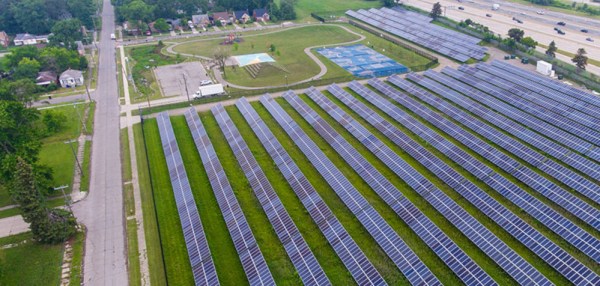
Both Chicago and Detroit have areas of vacant and underinvested land, and both are starting to see those plots as potential sites for clean energy projects, but is that what the communities want? The answer can be complicated, Audrey Henderson reports for the Energy News Network.
Detroit is home to 19 square miles of vacant land, and utility DTE Energy wants to build large-scale solar arrays on parts of it. Some residents and local officials say it’ll help combat dumping and other nuisance crimes, while also helping the city meet its climate goals. But other neighbors worry using the green space for solar will take away land from potential affordable housing projects, and say putting panels on top of other buildings or outside the city would make more sense.
A geothermal project in Chicago’s West Woodlawn neighborhood meanwhile avoids vacant plots altogether, while still bringing clean power to the South Side community. Geothermal systems require a lot of land to lay subterranean loop fields that circulate hot and cold water, making them hard to build in dense cities. But developers are putting this project’s loop fields in alleys between houses and apartment buildings, and linking those homes up to the heating and cooling source along the way.
Read more about the possibilities and hangups of siting clean energy in cities at the Energy News Network.
More clean energy news
📈 Methane emissions keep growing: The U.S. led an international effort to curb methane emissions, but a new study finds domestic emissions continue to grow amid increases in natural gas production. (New York Times)
🏡 Cracking the building code: A new federal rule will help counter weak building energy codes in North Carolina and other states by requiring new homes with certain federally-backed mortgages to include energy-saving features. (Energy News Network)
🚘 Turbocharging EVs: The Biden administration announces $3 billion in grants to build out an “end-to-end supply chain” for electric vehicles, seeking to challenge China’s dominance of the sector. (Associated Press)
🌊 Ongoing cycle: Offshore wind proponents say opposition to East Coast projects can be traced back to Robert F. Kennedy Jr.’s fight against wind turbines in the Nantucket Sound in the early 2000s. (Inside Climate News)
⚛️ Nuclear’s second chance: As it seeks to meet growing energy demand for AI technologies, Microsoft announces a 20-year power purchase agreement that will revive Pennsylvania’s Three Mile Island nuclear plant. (Bloomberg, New York Times)
🏭 Gas’s broken promises: West Virginia’s natural gas industry has boomed, but communities are seeing population declines and job losses instead of prosperity the industry had promised. (Mountain State Spotlight)
☀️ Coal plant reset: Repurposing the interconnection system at a large Minnesota coal plant set for retirement to support a massive solar project helps avoid potentially several years of regulatory steps to connect to the grid. (CNN)
📋 What’s stopping tribal clean energy: Researchers find a gauntlet of federal red tape hampers tribal nations’ clean energy development and could lead to $19 billion in lost revenues if the barriers aren’t addressed. (Grist)
🇺🇲 Plus, some politics
- Nearly half of the Inflation Reduction Act’s $115 billion in clean energy funding has gone to seven swing states critical to the U.S. election, creating as many as 50,000 jobs in electric vehicle, battery, and other clean energy manufacturing, according to a new analysis. (The Guardian)
- Environmental groups have seen donations skyrocket since President Biden left the ticket, and now plan to go on the offensive in presidential swing states and in tight congressional, state and local elections. (E&E News)
- Republican House Speaker Mike Johnson says some of the Inflation Reduction Act’s clean energy incentives are worth preserving even if his party takes over the White House and Congress next year. (E&E News)
- Vice President Kamala Harris has moved away from earlier Democratic Party pledges to end fossil fuel leasing on public land, raising concerns from advocates about political support for future climate action. (E&E News)
📢 We want to hear from you! Send us your questions, comments, and story tips by replying to this email.
💸 Support our work: The Energy News Network is powered by support from readers like you. If you like Energy News Weekly, share it with a friend! Or give today and help us keep our news open and accessible for all.
📧 Want more energy news? Sign up for our daily digests.
